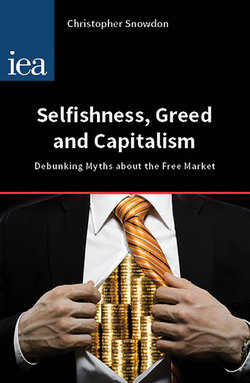Читать книгу Selfishness, Greed and Capitalism - Christopher Snowdon - Страница 5
На сайте Литреса книга снята с продажи.
Foreword
ОглавлениеWhen the Institute of Economic Affairs was founded, there was particular concern about economic discourse in the class of people F. A. Hayek described as ‘intellectuals’. These were people who were widely regarded as speaking with authority but who had no particular capacity for original thinking in relation to many of the issues on which they commented. One good example of such a person would be a member of the clergy when speaking about economic issues. It is true that he may have expertise in relation to some aspects of the subject, such as how to determine what is and what is not ethical behaviour in business. However, on technical aspects of economics and public finance, clergy probably know no more than the average layperson.
In recent years, a number of popular books on economics have come to the fore which are widely read and quoted by exactly the kinds of people Hayek identified. Some, such as those by Naomi Klein, are written by non-economists: in other words by the same intellectual class which is the source of the problem Hayek was identifying. Others are written by people with a strong academic record, such as Ha-Joon Chang. Chang comes in for some criticism in this monograph but it cannot be argued that he is a mere second-hand dealer in ideas.
In some of these popular economics texts, ideas that are arguable are sometimes presented as fact (or at least without consideration of contrary evidence) and certain things are said that are the complete reverse of the truth. A particularly favoured tactic of such authors is to argue that supporters of a market economy believe in certain things which they do not believe in at all (that is, a ‘straw man’ is erected). The straw man is then demolished and the reader is led to believe that the case for the market economy falls with it.
The misuse of economics is not confined to discussion of policy issues in the public square. Economics now feeds in to many subjects taught in schools and universities. In schools, subjects such as geography, and even science and religious education, involve the presentation of economic principles. In many degrees at universities (for example, business studies, international relations and geography) modules cover economic principles.
When economic ideas are taught in these contexts, there is not necessarily the proper analysis and discussion which would be expected in a specialist course. Teaching materials are provided to generalists and they tend to present ‘facts’ or ‘principles’ that are assumed to not need discussion and which are highly debatable.
This monograph is a very effective attempt to correct economic myths that prevail in public discourse and which are often promoted in schools and even universities. It begins by examining straw men, such as the assertion that economists believe that people behave selfishly or that economists think that GDP is all that matters. The fact that economists do not believe these things at all is easily established and it is surprising that eminent economists with good publication records (albeit not in the philosophy of economics) can honestly argue otherwise.
The author, Christopher Snowdon, then moves on to look at myths that can be subjected to empirical analysis and easily shown to be false. These myths, such as the idea that the poor are getting poorer while the rich get richer, or that we are working longer hours, are easily rebutted.
Christopher Snowdon performs a very important service in this book, which is a significant contribution to the Institute’s educational mission. The chapters are all very easy to read and rich with the necessary evidence. Anybody interested in economics or who is studying economics will find the points the author makes important in their own right. It will be even more valuable for those who have previously been introduced to the myths that are rebutted. The myths the author deals with are very widespread as they have been taken on board and regularly repeated by newspaper columnists, others in the media and economic commentators more generally.
Philip Booth
Editorial and Programme Director
Institute of Economic Affairs
Professor of Insurance and Risk Management
Cass Business School, City University, London
October 2014
The views expressed in this monograph are, as in all IEA publications, those of the author and not those of the Institute (which has no corporate view), its managing trustees, Academic Advisory Council members or senior staff. With some exceptions, such as with the publication of lectures, all IEA monographs are blind peer-reviewed by at least two academics or researchers who are experts in the field.
